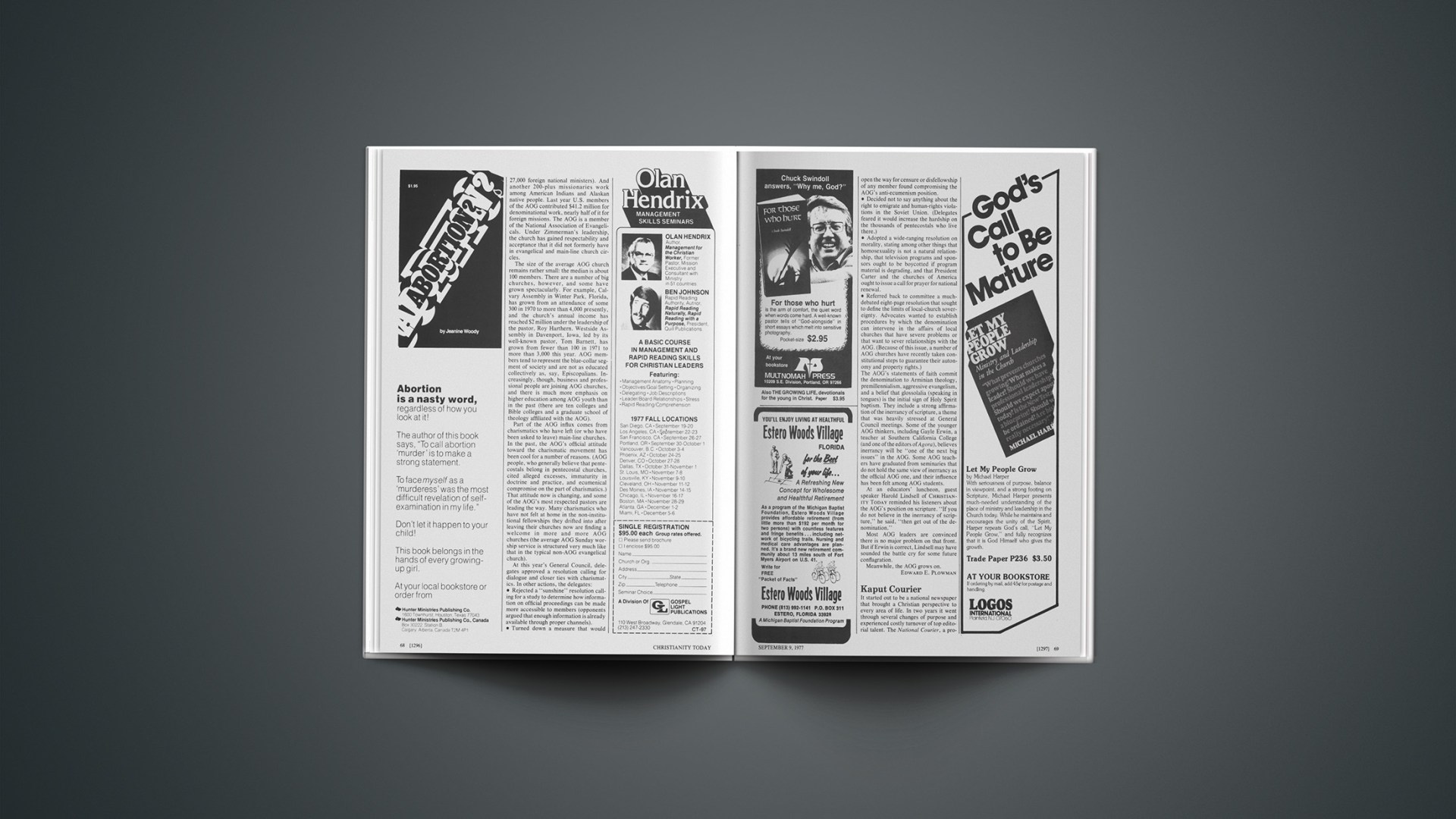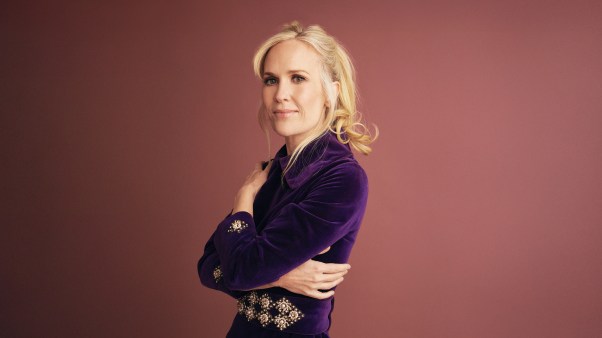Despite the fact that the 899,000-member Assemblies of God (AOG) is one of the fastest-growing denominations in the world, the secular media and even the religious press generally have paid little attention to the denomination. This year the press is at last taking note, but not necessarily for religious reasons.
In January, a nationally syndicated column by Jack Anderson and Jack Whitten aired allegations involving Thomas F. Zimmerman, the AOG’s general superintendent, and Don Shelton, the AOG’s stewardship director who has since resigned. Reporter Gale Baldwin of the Springfield, Missouri, Daily News published longer accounts at about the same time (the AOG is headquartered in Springfield). The stories disclosed that Zimmerman was chairman of the board of directors of Springfield’s Empire Bank, where most AOG funds were deposited. (The deposits were cut sharply in early 1976 when church leaders decided to limit the amount that could be deposited in any single bank.) Zimmerman, claimed the Anderson column, also held bank stock worth from $80,000 to $160,000.
The press accounts suggested that Zimmerman, Shelton, and Milton McCorcle, an AOG layman, had used their positions to gain potential profit personally in the purchase of 100 acres of land across from the proposed shopping center that Shelton had helped plan and Zimmerman’s bank had helped to finance. There were also other charges of financial improprieties and mismanagement at AOG headquarters. They apparently stemmed from questions and objections stated to Zimmerman and other church officials months earlier by Andrew Nelli, chairman of the AOG committee on finance and vice president of the Carnation company in Los Angeles. Others, including a group of reform-minded AOG ministers and lay members, became aware of the confrontation over finances, and when no action was taken, they leaked word to the press. After the press accounts appeared, Zimmerman resigned as bank chairman and divested himself of the stock but declined to comment publicly. Shelton resigned his AOG stewardship post saying he no longer could be effective in raising money for the church. Shelton also blamed the mess on “jealous and ambitious people who wished a change in leadership at our church.” He said he had done “absolutely nothing wrong.”
The Executive Presbytery, the AOG’s thirteen-member interim governing board, stated “categorically” that “not one cent” of AOG money had been “misapplied to any private venture.” The statement was based in part on the official audit of AOG books made by the Memphis firm of Frazee, Thomas, and Pate in March, 1976. Two of the firm’s partners, William Frazee and Earl Pate, are members of an AOG church whose pastor is James Hamill, one of the thirteen executive presbyters.
Although the executive presbyters seemed persuaded in their own minds that all was well, they did call for a “special audit” of the church’s stewardship department. They gave the job to Frazee, Thomas, and Pate—setting off more conflict-of-interest charges. The new audit, reported the presbyters, showed no evidence of misuse of AOG funds “by diversion, misappropriation, personal borrowing, or in any other improper manner.” In a three-page statement, they said an “intensive investigation” showed that Zimmerman had done nothing “illegal or unethical.” Shelton did not fare as well: the presbyters said they “deplored his involvement in real estate transactions and politics.” (A controversial land deal in 1973 involving Shelton and McCorcle was settled out of court.)
Zimmerman sent a three-page letter to the AOG’s ministers, apologizing for “an error in judgment that involved my participation in a relationship which has brought embarrassment to our fellowship.” He said he had resigned from the bank’s board, divested himself of the stock, and was in the process of selling his land holdings. Press reports indicated that the stock shares were sold to other members of the bank’s voting trust, five of whom were members of the AOG.
Some AOG ministers, educators, and other members were not satisfied with the way the Zimmerman case was handled. They thought the investigation had not been as thorough or as objective as it could have been. They were unhappy that no mention of a crucial situation appeared in the denomination’s publications. (When asked about this, one AOG official told a religious press assembly last spring that the less people know about such matters, the easier it is to iron everything out.) Critics also alleged privately that Zimmerman had become too powerful in his nearly eighteen years in office and that the atmosphere at AOG headquarters and among the clergy was stifling as a result.
Last month nearly 5,000 voting delegates and several thousand other AOG members gathered in Oklahoma City for the six-day meeting of the General Council, the AOG’s biennial convention. The delegate registration was the largest in the AOG’s sixty-three year history. On the eve of that convention, two unofficial AOG publications—Agora and Restoration—and the independent National Courier, charismatic-oriented tabloid, dealt with the AOG leadership issue.
Agora, a new “magazine of opinion” published by a group of AOG educators and pastors (the chief staff members are associated with the 650-student Southern California College), took a moderate view. The situation is neither the AOG equivalent of Watergate that some contend it is, said the editors, nor is it the result of a “conspiracy attacking the evangelical society,” as held by the executive presbyters. However, they said, there is a need to confront “the problem of accountability and integrity in denominational leadership.” They recommended that “only those persons be elected or reelected to leadership positions who are willing to live in the light of close observation, maintain behavior above reproach, and become by nature self-revealers.” The editors also called for more openness in AOG official proceedings, with members having the right of access to all but personally sensitive minutes of deliberative bodies.
Restoration, published jointly by nine large AOG churches that want closer connections between the AOG and the charismatic movement, explored what could be expected under the leadership of each of three possible successors to Zimmerman should Zimmerman choose not to run. (He is 65.)
The National Courier published a wrap-up account of the controversy and in an unusual move praised Zimmerman editorially but recommended that “serious prayer be given to effecting a change in leadership at this time.” Zimmerman’s “confessed error in judgment has brought division” that may make it difficult to hold the AOG together if he does not bow out, said the Courier.
For three days prior to the General Council meeting, the matter was rehashed in closed sessions of the General Presbytery, the 200-member policy-making and advisory body of the AOG. First, Zimmerman reviewed the allegations, gave his responses, then called for “open, frank discussion” (there was little). He also proposed a new study by an independent committee composed of presbytery members. The committee was chosen and it began its review immediately. Meanwhile, a district superintendent, Eugene Jackson of Tennessee, introduced a resolution blaming the whole affair on an attack of the devil through the press, whose actions were “deplored” as irresponsible. The measure criticized a “breach of ministerial ethics” by Zimmerman’s critics, and it called for disciplinary action to be taken at the district level against the editors of Agora and Restoration. It was passed by voice vote without discussion. An attempt the next day to reconsider the resolution was soundly defeated, but cooler heads prevailed the third day, and the measure was rescinded (but not expunged from the minutes). A source said a door was left open, however, for disciplinary action to be taken at the district level. This could range from a letter of reprimand to cancellation of ministerial credentials (the latter is unlikely, said the source).
The special committee returned with a report giving Zimmerman a clean bill of health. A strong statement of confidence in Zimmerman’s leadership was adopted by a secret-ballot vote of 168 to 8. It expressed satisfaction with the “thorough and impartial” investigation by the executive presbyters and said no evidence of wrongdoing could be found. It also went on record “as deploring the action of those who choose to bypass the scriptural remedies available within the church for resolving differences between bretheren, but who resort to divisive methods to express personal grievances.
The statement of confidence was received without opposition in one of the first actions of the General Council. Zimmerman was given a standing ovation when he was introduced to give the keynote message.
Another early business item was the election of officers. Under AOG procedure, every delegate submits a secret written nomination. If any nominee receives two-thirds of the nominations, he is declared elected. There had been considerable pre-convention speculation that if Zimmerman failed to be reelected on the nomination ballot he would step out of the running (he had received 93 per cent four years ago). Zimmerman was accorded another ovation when the results were announced: he received 2,700–79.4 per cent—of the 3,399 votes cast (2,266 were needed to win on the first ballot).
Zimmerman’s acceptance speech was the most moving part of the council’s proceedings, and it was punctuated often by sustained applause. He spoke forthrightly, at times sounding deeply saddened, at other times expressing a strong get-tough position. He said he had always tried to be “transparent and open,” and that he had always put God’s will first in his life. He indicated his bank relationship had been on the basis of service to the community, and—contrary to press reports—he said he had never had much over $5,000 in bank stock. The controversial land transaction, he said, was a “very legitimate” one that “any of you would have done under similar circumstances.” But, said he, it was a privilege to lay “1000 per cent” of himself and all of his possessions “on the altar of God.” He stressed that he and his wife were not wealthy.
As for the vote, said Zimmerman, the count was “exactly what I looked to God for as a sense of direction,” suggesting that he would have stepped aside had he received less. He said he had considered seriously the possibility of retiring this year but that the “circumstances that have transpired robbed me of that option.” When the sheep are under attack, he said, “the shepherd doesn’t run.”
He denied that the size of the vote indicated a fracture in the fellowship. “For anyone to get elected on the nomination ballot after all the politicking that has gone on is a small wonder in itself,” he declared. He said he would not resort to “power and might” in his administration but that he would not vacillate in decision-making when strength of leadership is called for.
As for the press, said Zimmerman, the AOG will not rely on newspapers outside or inside the perimeters of the church to tell it how to vote. “We have done all the muckraking we need to do,” said Zimmerman, “and we don’t need the world to design our agenda.”
When Zimmerman finished his speech, the audience gave him another standing ovation. There were no floor challenges then or later to anything he said, and the matter was not referred to in any of the successive business proceedings. Some critics said they still had serious questions, but they admitted privately that they were too “afraid” to speak out. “They could take away my papers,” explained one pastor. (AOG government is a blend of congregational and presbyterian forms: local churches are autonomous, but ministers are ordained by district councils, and they are subject to discipline by the denomination.)
The size of the Zimmerman vote defies analysis. When compared to the 1973 vote, it seems to show slippage in his popularity—especially if many of those who left right after the voting took place had come purposely to support the general superintendent. On the other hand, if many of those were people who do not normally attend council meetings but who came this year specifically to vote against Zimmerman, then his true support might be greater than indicated on the surface.
Another factor was also present in voting factors. One respected AOG layman explained it this way: “Sure, I’m not totally satisfied by the explanations, and I think it’s time for a change. But Tom has been a great leader. He has done a lot for our church and he doesn’t deserve to go out under a cloud. So I voted for him.”
Indeed, the AOG has prospered abundantly during Zimmerman’s administration. In the past ten years alone there has been a 57 per cent increase in U.S. members (to 898,711 with about 500,000 additional adherents). The increase since the last biennial council meeting has been a whopping 14.4 per cent, the biggest two-year hike in twenty years. Overseas members and adherents number 4.7 million in ninety-eight countries, an increase of 182 per cent over a decade ago and 17 per cent in the last two years. At the present rate of growth, the AOG’s overseas constituency will double every seven years. (Brazil already has a larger AOG constituency than the United States, and the AOG in South Korea has become that nation’s fastest growing denomination.) There are 1,136 AOG foreign missionaries (teamed with more than 27,000 foreign national ministers). And another 200-plus missionaries work among American Indians and Alaskan native people. Last year U.S. members of the AOG contributed $41.2 million for denominational work, nearly half of it for foreign missions. The AOG is a member of the National Association of Evangelicals. Under Zimmerman’s leadership, the church has gained respectability and acceptance that it did not formerly have in evangelical and main-line church circles.
The size of the average AOG church remains rather small: the median is about 100 members. There are a number of big churches, however, and some have grown spectacularly. For example, Calvary Assembly in Winter Park, Florida, has grown from an attendance of some 300 in 1970 to more than 4,000 presently, and the church’s annual income has reached $2 million under the leadership of the pastor, Roy Harthern. Westside Assembly in Davenport, Iowa, led by its well-known pastor, Tom Barnett, has grown from fewer than 100 in 1971 to more than 3,000 this year. AOG members tend to represent the blue-collar segment of society and are not as educated collectively as, say, Episcopalians. Increasingly, though, business and professional people are joining AOG churches, and there is much more emphasis on higher education among AOG youth than in the past (there are ten colleges and Bible colleges and a graduate school of theology affiliated with the AOG).
Part of the AOG influx comes from charismatics who have left (or who have been asked to leave) main-line churches. In the past, the AOG’s official attitude toward the charismatic movement has been cool for a number of reasons. (AOG people, who generally believe that pentecostals belong in pentecostal churches, cited alleged excesses, immaturity in doctrine and practice, and ecumenical compromise on the part of charismatics.) That attitude now is changing, and some of the AOG’s most respected pastors are leading the way. Many charismatics who have not felt at home in the non-institutional fellowships they drifted into after leaving their churches now are finding a welcome in more and more AOG churches (the average AOG Sunday worship service is structured very much like that in the typical non-AOG evangelical church).
At this year’s General Council, delegates approved a resolution calling for dialogue and closer ties with charismatics. In other actions, the delegates:
• Rejected a “sunshine” resolution calling for a study to determine how information on official proceedings can be made more accessible to members (opponents argued that enough information is already available through proper channels).
• Turned down a measure that would open the way for censure or disfellowship of any member found compromising the AOG’s anti-ecumenism position.
• Decided not to say anything about the right to emigrate and human-rights violations in the Soviet Union. (Delegates feared it would increase the hardship on the thousands of pentecostals who live there.)
• Adopted a wide-ranging resolution on morality, stating among other things that homosexuality is not a natural relationship, that television programs and sponsors ought to be boycotted if program material is degrading, and that President Carter and the churches of America ought to issue a call for prayer for national renewal.
• Referred back to committee a much-debated eight-page resolution that sought to define the limits of local-church sovereignty. Advocates wanted to establish procedures by which the denomination can intervene in the affairs of local churches that have severe problems or that want to sever relationships with the AOG. (Because of this issue, a number of AOG churches have recently taken constitutional steps to guarantee their autonomy and property rights.)
The AOG’s statements of faith commit the denomination to Arminian theology, premillennialism, aggressive evangelism, and a belief that glossolalia (speaking in tongues) is the initial sign of Holy Spirit baptism. They include a strong affirmation of the inerrancy of scripture, a theme that was heavily stressed at General Council meetings. Some of the younger AOG thinkers, including Gayle Erwin, a teacher at Southern California College (and one of the editors of Agora), believes inerrancy will be “one of the next big issues” in the AOG. Some AOG teachers have graduated from seminaries that do not hold the same view of inerrancy as the official AOG one, and their influence has been felt among AOG students.
At an educators’ luncheon, guest speaker Harold Lindsell of CHRISTIANITY TODAY reminded his listeners about the AOG’s position on scripture. “If you do not believe in the inerrancy of scripture,” he said, “then get out of the denomination.”
Most AOG leaders are convinced there is no major problem on that front. But if Erwin is correct, Lindsell may have sounded the battle cry for some future conflagration.
Meanwhile, the AOG grows on.
Kaput Courier
It started out to be a national newspaper that brought a Christian perspective to every area of life. In two years it went through several changes of purpose and experienced costly turnover of top editorial talent. The National Courier, a project of charismatic entrepreneur Dan Malachuk, finally folded this month. At the end it was featuring mostly news and views of charismatics for charismatics. The last issue was dated September 16.
The biweekly tabloid, Malachuk said, “just was not getting subscriptions.” An early plan to get it on the racks at supermarket checkout stands never worked. There was little more success with a network of distributors selling copies through bookstores and newsstands. An aggressive mail promotion never realized a renewal rate of more than 25 per cent.
All the problems were not financial, however. There were policy conflicts between management and editorial staffers. Some enterprise reporting intended for front page exposure failed to get front office approval. The top editorial position, that of managing editor, was not listed on the masthead in the final three issues. The last person to hold that job, James M. Talley, had a parting of the ways with the management early in the summer.
Malachuk said “most” of the Courier staffers would be absorbed into other enterprises of Logos International Fellowship, the umbrella organization. Some are moving to the bi-monthly Logos Journal magazine. That publication, he announced, will expand its news coverage before the end of the year and will go monthly as soon as possible. Other Courier people are moving over to the Logos book division.
As the last issue of the paper was being edited, three of six remaining editorial staff members did not have new Logos assignments, and they were being encouraged to look elsewhere for work.
Whether the business staff members who shift to other jobs will be able to generate enough advertising and circulation revenue to cover costs of the whole Logos operation remains to be seen. Malachuk, meanwhile, is putting increased emphasis on sponsorship of conferences and related travel. The organization, headquartered in Plainfield, New Jersey, is now promoting its “Annual Jerusalem World Conference on the Holy Spirit” for November. In July it conducted what it described as the fourth world conference on the Holy Spirit in Lausanne, Switzerland (the first three having been in Jerusalem). In contrast to the earlier meetings, however, the Lausanne edition attracted fewer Americans buying their travel through Logos. Over 70 per cent of the 1,500 attending were said to be from Europe.
Internationalizing Youth For Christ
Youth For Christ (YFC) directors from around the world gather every three years for a session which is perhaps unique in the Christian world. Each national leader from the fifty-two nations represented has equal voice in determining strategy and policy for the international evangelism movement. The latest in the series of triennial conferences was held last month in Rio de Janeiro. It attracted 128 delegates and guests from forty-eight countries.
The conferences opened amid repercussions from Brazil’s delicate international relations. The representatives from Liberia and Sierra Leone were turned back by Brazilian authorities who refused to grant visas. In addition, the delegate from Transkei, the new black South African state unrecognized by Brazil, was refused entrance.
Brazil was chosen as the site to coincide with the twenty-fifth anniversary of Brazil’s YFC, and the hosts even brought out Miss Brazil to help with conference details. While South Africa and Jamaica also celebrated their thirtieth anniversaries and Singapore its twentieth, Denmark was welcomed as a fledgling program.
The conference consisted of three parts: 1) inspiration, from such speakers as Samuel Kamaleson, vice-president-at-large for World Vision, and Gary Collins, author and Trinity Seminary professor; 2) information, where member countries shared seminars on what programs work best in their culture; and 3) council business.
During council business sessions, a new constitution was adopted which reaffirmed the autonomy of the council delegates and strengthened the authority of the board of directors. In an attempt to bring in more cosmopolitan leadership, the council agreed, in principle, to increase membership to fifteen. Five of the board members are headquarters officers, and the remainder will represent each of ten geographic regions. The first four regional representatives have been chosen, the latest being David Thomas, Liberia’s ambassador to the United Nations. Hopefully, the other six will be seated on an interim basis before the next council meeting.
Sam Wolgemuth was reelected both chairman of the council and president (or chief operating officer) of the international YFC. Canadian Jim Wilson, who has been executive director for six years, resigned to become vice-president-at-large. He has been headquartered in Geneva, Switzerland. His successor for the next three years will be Jim Groen, executive director of Denver YFC. In accepting the limited term Groen expressed a strong commitment to locate and develop a Third World leader for that position. While Groen is expected to be based in Denver, the Geneva office will continue.
Clearly, however, the main excitement of the conference came during the evening sessions when various regional leaders reported on their ministries. Contrary to U.S. trends, the proportion of the population under twenty-one is over 50 per cent and expanding in most other countries. Thus, the worldwide potential of youth evangelism is practically unlimited.
Delegates heard inspiring reports from such countries as Nepal, Egypt and Saudi Arabia. In Buddhist and Muslim countries such as these, a teenager’s conversion to Christ will practically guarantee his expulsion from home, and in some cases he may be arrested. In contrast, Korea Youth For Christ reported 80,000 conversions per year; there and in many African countries Youth For Christ has free access to schools, where religion is taught.
In typical free-wheeling Youth For Christ fashion, national programs have devised their own unique methods of reaching youth in their culture. Among those reported:
• Portugal: Burdened by a “minority complex” in a country where only one of 201 persons is an evangelical, YFC sponsored a table tennis team named Youth For Christ which eventually won the national championship and attracted major publicity.
• Brazil: Close location to the slums (favelas) in Belo Horizonte prompted YFC to begin camps and day care centers for impoverished slum-dwellers. Now four staff members follow up children sponsored by World Vision in these and other programs.
• Australia: Mass youth rallies of 3,000 and up net much response among teenagers, 90 per cent of whom have never held a Bible.
• Germany: YFC uses a “tea-mobile,” a sort of mobile coffee bar (coffee soon became outpriced)—a one-and-a-half story bus which parks in front of high schools. Students are invited into the vehicle for “rap sessions” and tea.
The conference ended with a communion service in which delegates from India and Pakistan and South Africa and the black African nations broke bread together in a show of unity. The council seems to be comfortably settling into a fully international character where the U.S. and Canada increasingly play a support role and not a “boss” role. This was shown by $48,000 in donations raised in the U.S., Holland, and Canada to pay expenses of the Third World delegates who would have equal voting strength. Veterans noticed more non-western dress than ever before and worship conducted in languages other than English.
PHILIP YANCEY
Florida Oranges: Peals of Protest
A church boycott against Florida orange juice?
That action was called for in a resolution passed by the 600-plus delegates at the annual meeting of the nine-year-old Universal Fellowship of Metropolitan Community Churches (MCC) last month in Denver. The MCC is a homosexual-oriented church body and its members are upset by singer Anita Bryant’s campaign against gay rights. The singer does commercials for the Florida Citrus Commission, so the MCC will keep up the boycott against Florida’s oranges and orange products until the commission “takes a stand that homosexuals have rights,” according to MCC founder-president Troy Perry. Moreover, the MCC wants the National Council of Churches and its thirty-three member-denominations to participate in the boycott, too.
The MCC, which adopted a $168,000 budget for next year, also voted to ask for the establishment of a White House commission to study child sexual abuse and child pornography. “This problem has got to be laid to rest,” declared Perry, author of The Lord Is My Shepherd and He Knows I’m Gay. “We’re not the child abusers. In 98 per cent of such cases, it’s the heterosexuals. And those aren’t our statistics. They’re from the Kinsey report.”
One of the most controversial issues in the MCC concerns “sexist” language in the liturgy. Perry told Denver Post reporter Virginia Culver that the MCC, like some other church groups, is trying among other things to eliminate language that refers to God only in the male form. But, said he, “There is as much resistance in this group to eliminating sexist language as there is in any church.” Gay churches, he asserted, “aren’t as liberal as most people think.” A convention resolution urged MCC churches to work out the issue peacefully. (Some churches apparently have split over it). Perry, who has a pentecostal background, described himself and the 115-congregation MCC as evangelical “born-again types.” On the other hand, he pointed out, the MCC is the best sexually integrated organization in the entire homosexual community. About one-fourth of the MCC’s ministers are women, he said, and 40 percent of the MCC’s 23,000 members are women.
Undesirable Date
Newport, Rhode Island, citizens will go to the polls September 13—all but the Jews that is. The municipal election falls on the Jewish holiday Rosh Hashanah, and it has created a furore of sorts since participation in such activity on a holy day would violate strict Jewish law. One rabbi said 300 families would be disenfranchised if the city did not shift the date.
City council members asked the help of Rhode Island governor Joseph Garrahy, and he asked for a ruling from the Supreme Court. The state tribunal said the voting could not be postponed since state law provides that only the dates of primaries can be shifted when they fall on religious holidays. Legislators quickly lined up to announce that when the next session of the legislature convenes they will introduce bills to authorize postponement of general elections also.
Meanwhile, Jews did not receive with too much enthusiasm the suggestion that they vote absentee. State law requires the voter who requests an absentee ballot to certify that he will be out of state or sick on election day, and Jewish leaders said this is “subterfuge” that they could not countenance.
A Question Of Consistency
If years of wrangling over leadership of the Lutheran Church-Missouri Synod (LCMS) have left the impression that it is the most conservative Lutheran body in North America, then the Wisconsin Evangelical Lutheran Synod (WELS) did its bit last month to correct the impression. Even though no one has yet proposed official discussions between the two conservative denominations, delegates to the WELS biennial convention resolved that “it would be premature at this time to begin formal doctrinal discussions with the Lutheran Church-Missouri Synod.” The WELS commission on inter-church relations had earlier reported on actions of the LCMS Dallas convention (see August 26 issue, page 36). The panel said that while a “renewed doctrinal concern” was reflected in Dallas actions, there were factors that “appeared to keep the convention from carrying through … with consistency.”
WELS, which now reports a membership of 400,000 and a growing program of missions at home and abroad, suspended fellowship with LCMS in 1961. The denominations disagreed then over the issue of LCMS relations with other less conservative Lutheran groups. The WELS commission told the 1977 convention that LCMS would have to end fellowship with the American Lutheran Church and withdraw from the Lutheran Council in the USA before any consideration could be given to doctrinal discussions.
Concentrated in Minnesota and Wisconsin, but with congregations in forty-five states, WELS is beginning new missions at the rate of twenty-five a year. It has 1,090 organized churches. Among the highlights of the convention program was dedication of a new $1.1 million facility for the adult mentally retarded at Belle Plaine, Minnesota.
Personalia
Few people decline invitations from the President of the United States, but the Greek Orthodox primate of the Americas, Archbishop Iakovos, did last month. He reluctantly passed up the opportunity to be in the American delegation at the funeral of his long-time friend, Archbishop Makarios (see August 26 issue, page 39), fearing political repercussions. He thought his presence on the embattled island of Cyprus might be misunderstood by the Turks, who are in control of the territory where the Orthodox patriarchate is located. Several Americans of Greek extraction were in the group, but among the others named by the President was his sister, lay minister Ruth C. Stapleton. Electors of the Church of Cyprus begin the process of choosing a new archbishop this month.
A Southern Baptist field representative for eight countries in Europe, Isam E. Ballenger, has been elected sixth president of the International Baptist Theological Seminary, Ruschlikon, Switzerland.
When Evangel College at Springfield, Missouri, fields its first varsity football team this fall, the coaching staff will include four former teammates on the professional Birmingham Americans squad in the World Football League. Latest to join the staff, as offensive line coach, is Paul Costa, who also was a Buffalo Bills tight end and tackle. Head coach is Denny Duron, and the other ex-Birmingham players are Mike Bartik and Gary Champagne.
New York City’s Riverside Church, affiliated dually with the American Baptist Churches and the United Church of Christ, for the second time in succession has called a United Presbyterian to be its senior minister. William Sloane Coffin, Jr., 53, former Yale chaplain and prominent social activist, will take over the Manhattan pulpit in November. Some members of the church opposed him on grounds that he has been divorced and is now separated from his second wife, but when the vote was taken the tally was 372 to 2. Coffin will be only the fourth pastor of the fifty-year-old church. The third, Ernest T. Campbell, resigned last year.
Loren Cunningham, founder-director of Youth With a Mission (YWAM), and Corrie ten Boom (The Hiding Place) are co-hosting a new weekly television program produced by YWAM. The series features interviews with Christian workers on location (Mother Teresa of India is among those who have been interviewed). YWAM is also producing “Promise Box,” a children’s program patterned after “Sesame Street.”










